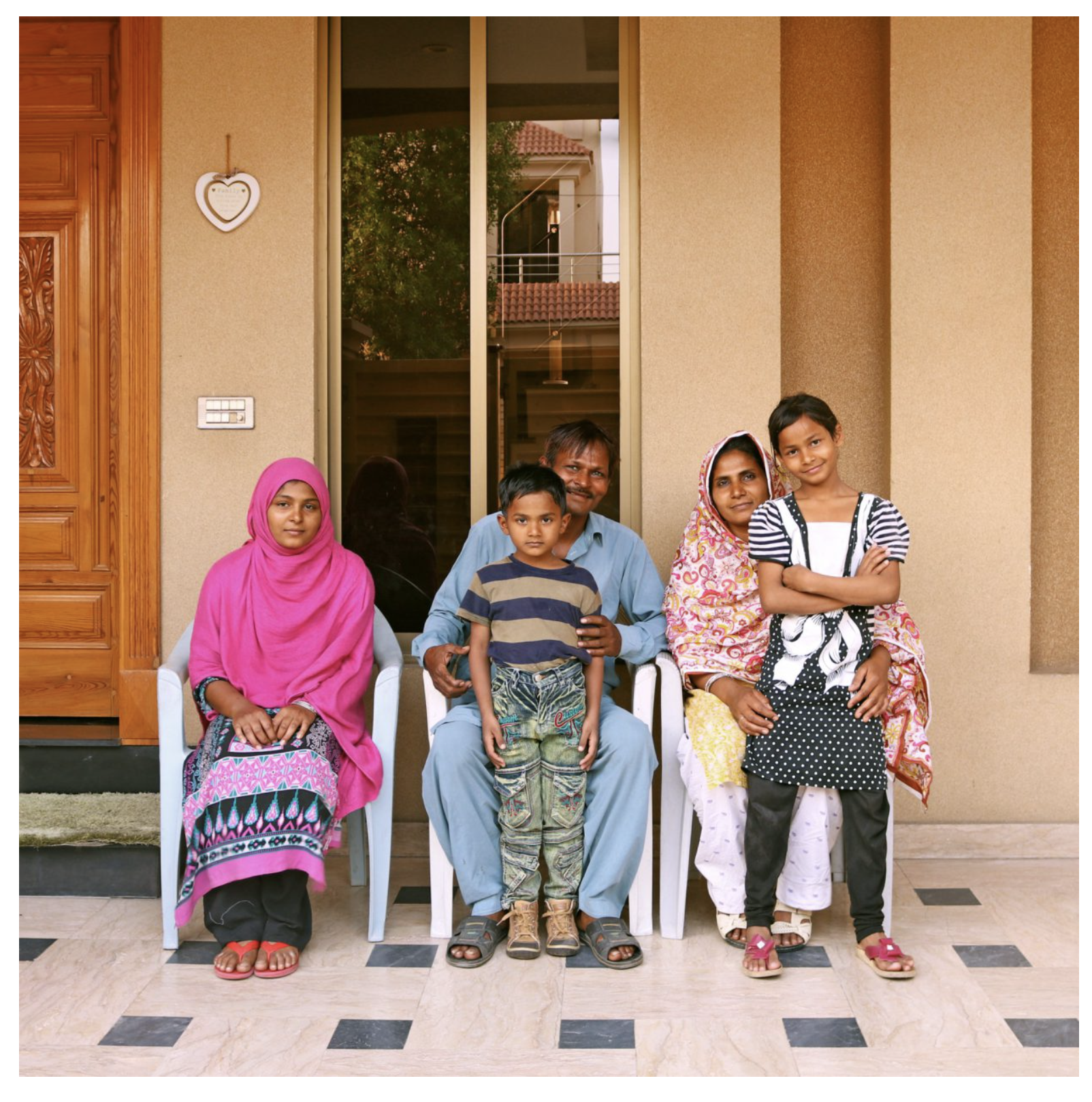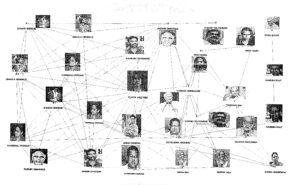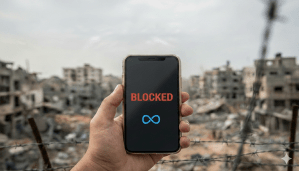

As an extension to The Polis Project’s Instagram takeover, The Polis Project features the work of Ema Anis and her project – The Walled Street Journal.
Look at advertisements of gated communities and you’ll see the promise of not just a home but heaven: a complete privileged, upper-class and secure lifestyle. But while this lifestyle seems ideal, there are larger insidious issues the physical barriers erected by gated communities are creating – both within minds of the people as well as on the social fabric of our cities.
With this project “The Walled Street Journal”, Pakistani photojournalist Ema Anis examines the rise of private gated communities in Pakistan and brings to light the neoliberal realities by documenting one of the most allegedly luxurious gated communities – i.e. Bahria Town, Lahore.
Bahria Town, despite being notorious in reputation for its architectural horrors and land grab controversies, continues to attract people in hordes. But what is the bitter truth hiding behind the walls of the gated community?
“One of the most alarming aspects of neo-liberalism is how it takes away power from the state – the one that allows it to question the influential, to hold it accountable, or to rein it back in if it crosses the line.”

In neo-liberalism, “democracy is reduced to theatre”, writes author George Monbiot in a Guardian article. These simple words explain the subtle, yet dangerous, nature of neo-liberalism that co-exists with democracy and flourishes at the hands of those pulling the strings from behind the curtains. One of the most alarming aspects of neo-liberalism is how it takes away power from the state – the one that allows it to question the influential, to hold it accountable, or to rein it back in if it crosses the line. And with this weakened state, powerful private entities are getting leeway in exercising whatever ills they desire. The state is then reduced to only exercise its power and impose strict control on those who lie at the bottom ring of the ladder in the society. Gated communities have emerged as new spaces of neo-liberalism, taking away key responsibilities of the state and handing them over to private entities that only cater to a certain privileged class, consequently creating a further classist society and a mindset that encourages the abandonment of the state. The image shows “Bahria Homes”, one of the poshest neighbourhoods of Bahria Town in Lahore, Pakistan. Built with an exterior resembling the American residential architecture, these homes face an Eiffel Tower replica that brings hordes of visitors every day. Despite having no additional layer of security around the premises, this area also claims to be the safest with no boundary walls or grills on windows that are typical of all Pakistani homes because of security concerns.

“The upholders of neo-liberalism justify the segregation of society in the name of “the law of nature”, thereby perpetuating a mindset which believes that the rich deserve to be rich because they are successful and the poor deserve to stay poor because “there’s nothing much they can do about it”. The mindset manifests itself in its physical form through gated communities.”
The upholders of neo-liberalism justify the segregation of society in the name of “the law of nature”, thereby perpetuating a mindset which believes that the rich deserve to be rich because they are successful and the poor deserve to stay poor because “there’s nothing much they can do about it”. The mindset manifests itself in its physical form through gated communities. It is the idea that every other person who falls outside the ambit of your social strata is to be considered inherently “impure”, “dishonest”, and “a cheater” – and thus, must be kept as far away as possible. According to an article by Aurora, “gated communities are a dangerous trend, as they accentuate even more starkly the divide between the affluent, the average and the severely underprivileged.
“With money comes power, and with power comes zero accountability.”
With money comes power, and with power comes zero accountability. This is the case for all the elite of the country, who further their monetary gains through their private commodities via all legal and illegal means. Interestingly, whenever we talk about corruption being done by the elite, we fail to look beyond politicians. While everyone is quick to jump on those holding public office to be brought to task, there is no uproar for the private powerful entities that are indulging in the very same malpractices. And one of the main reasons why there is no accountability is because there is no access to information. Commodities, such as gated communities, keep their doors tightly shut.

“Imagine if everything turned into gated communities. Cities will come to like zoos where different “sets of people” will be living in different enclosures, hardly ever interacting with each other and not being able to move about in different areas either.”
Paranoia is driving us all crazy. And it is making itself increasingly visible in our guarded homes, grilled windows, huge spiked doors, and now through these walls that cut off and seclude entire communities, creating cities within cities. By largely decreasing interaction with the city and with different peoples, the gated community residents and those in support of ‘walled streets’ are giving in to their paranoia and as a result, promoting a culture which restricts movements for a large segment of the society. This is the gated mentality which tells us that to keep ourselves safe, we need to lock the others out (and eventually end up locking ourselves in). Imagine if everything turned into gated communities. Cities will come to like zoos where different “sets of people” will be living in different enclosures, hardly ever interacting with each other and not being able to move about in different areas either.

“When entities get privatized, they begin to cater to only the daulatmand (rich) areas because that is where they get their revenue from,” says Pakistani urban planner and architect Arif Hasan. “And this happens everywhere in the world where privatization takes place in the absence of government regulatory control.”
Many people argue that they need private entities to provide them with housing, infrastructure and basic commodities because their state isn’t doing anything for them – an argument which justifies the existence of gated communities for them. But if this were the case, the states that are considered competent, such as the United States, would not be seeing the increasing number of gated communities. The desire for such walled communities doesn’t necessarily come from the doings – or the lack thereof – of the state, but more so because of privatization. “When entities get privatized, they begin to cater to only the daulatmand (rich) areas because that is where they get their revenue from,” says Pakistani urban planner and architect Arif Hasan. “And this happens everywhere in the world where privatization takes place in the absence of government regulatory control.”
“Pick a sphinx from here, add an Eiffel Tower from there and place a Trafalgar Square with “Allah” on its top – no need for any meaningful creative architecture.”
“Hum Lahore ko Paris bana denge” (Translation: We’ll turn Lahore into Paris): The imperial colonialism deep-rooted in our minds pushes us into worshipping anything and everything that is even remotely Western. And in blindly following all that is from the West, we begin to lose touch with our own realities. The architectural development of Bahria Town reflects the copy-pasting culture that is completely out of the context of our identities and cultural histories. Pick a sphinx from here, add an Eiffel Tower from there and place a Trafalgar Square with “Allah” on its top – no need for any meaningful creative architecture. Yes, we need development but not at the cost of getting stuck in the desperation of turning Lahore into some weird, fetishized version of Paris.
“But when you erect walls around yourself to limit access to the outside world, in some way you end up limiting yourself.”
What happens inside the walls stays inside the walls: Fear has been one of the driving factors for almost all of the residents to have moved to Bahria Town. They all want a safer environment for their children, and understandably so. We live in a country riddled with crime and terrorism, and we all want to stay safe. But when you erect walls around yourself to limit access to the outside world, in some way you end up limiting yourself. Gated communities such as Bahria Town, through their key attractive feature of providing every commodity through private means, actually cut off access to other important things outside its walls – including the state’s authority, the rule of law and media access.
“What is the historical mindset that gives birth to the concept of gated communities? According to Pakistani urban planner Arif Hasan, the phenomena of gated communities in the Pakistani society should be looked at from the historical perspective of our post-partition reality.”
What is the historical mindset that gives birth to the concept of gated communities? According to Pakistani urban planner Arif Hasan, the phenomena of gated communities in the Pakistani society should be looked at from the historical perspective of our post-partition reality. If you look from the historical perspective, youíll see that all our villages and cities without exception were traditionally built around the basis of ethnicity, religion or caste. These communities might not have had gates but they were still “gated”. Now, these two things have come together: Religious caste and ethnic homogeneity along with a wall and a gate [to form gated communities].
Bibliography
George Monbiot, Neoliberalism – the ideology at the root of all our problems, The Guardian (2016), https://www.theguardian.com/books/2016/apr/15/neoliberalism-ideology-problem-george-monbiot
Ayesha Shaikh, Pakistan’s real estate divide, Aurora (2017), http://aurora.dawn.com/news/1141727
Shazaf Fatima Haider, Luxury and privilege inside Karachi’s gated communities, Herald (2017), http://herald.dawn.com/news/1153661
Paul Verhaeghe, Neoliberalism has brought out the worst in us, The Guardian (2014), https://www.theguardian.com/commentisfree/2014/sep/29/neoliberalism-economic-system-ethics-personality-psychopathicsthic
Farha Ghannam, The Promise of the Wall: Reflections on Desire and Gated Communities in Cairo, Jadaliyya (2014), http://www.jadaliyya.com/Details/30034/The-Promise-of-the-Wall-Reflections-on-Desire-and-Gated-Communities-in-Cairo
Selhan Yalçin Usal, A Nilay Evcil, Neslihan Türkmenoğlu Bayraktar, Conspicuous Life Culture And Gated Communities, http://akademikpersonel.kocaeli.edu.tr/nturkmenoglu/bildiri/nturkmenoglu29.12.2009_03.33.12bildiri.pdf
Protected Fortresses What Makes Gated Communities so Popular? DW English (2009), https://www.youtube.com/watch?v=BYBDLOKQ0MM
Happiness for some in Pakistan’s gated communities, AFP news agency (2013), https://www.youtube.com/watch?v=ZvKOCZuZAiM
Fahim Zaman, Naziha Syed Ali, Bahria Town Karachi: Greed unlimited, Dawn (2016), https://www.dawn.com/news/1252809
Karim Kesseiba, Cairo’s Gated Communities: Dream Homes or Unified Houses, Science Direct (2015), http://www.sciencedirect.com/science/article/pii/S1877042815000907
Arif Hasan, Urban neo-liberalism, Dawn (2016), https://www.dawn.com/news/1271318/urban-neo-liberalism
Arif Hasan, Urban land reform, Dawn (2015), https://www.dawn.com/news/1194490/urban-land-reform
Arif Hasan, Ugly Karachi, Dawn (2016), http://arifhasan.org/articles/ugly-karachi
Rich Benjamin, The Gated Community Mentality, The New York Times (2012), http://www.nytimes.com/2012/03/30/opinion/the-gated-community-mentality.html
Razia Latif, Social Fragmentation And The Gated Housing Communities: Demise Of Lahore; The City Of Gardens And Colleges, http://www.bnu.edu.pk/bnu/Portals/0/Images/bnu/sa/SA%20Research%20&%20Projects/RHSA%20faculty%20papers%20at%20Istanbul%20Conference%20(Razia%20Latif).pdf
Brian Kuan Wood, Gated Communities, Domus (2011), http://www.domusweb.it/en/op-ed/2011/01/20/gated-communities.html
Salwa Ismail, A private estate called Egypt, The Guardian (2011), https://www.theguardian.com/commentisfree/2011/feb/06/private-estate-egypt-mubarak-cronies
Sarah Goodyear, Do Gated Communities Threaten Society? CityLab (2012), http://www.citylab.com/crime/2012/04/do-gated-communities-threaten-society/1737/
Joseph Henry Staten, What Exists is Good: On “The Architecture of Neoliberalism”, Los Angeles Review of Books (2017), https://lareviewofbooks.org/article/what-exists-is-good-on-the-architecture-of-neoliberalism/
Owen Hatherley, The Architecture of Neoliberalism by Douglas Spencer review – privatising the world, The Guardian (2017), https://www.theguardian.com/books/2017/jan/12/the-architecture-of-neoliberalism-douglas-spencer-review
Naziha Syed Ali, How Karachi’s public parks are being gifted to rapacious commercial interests, Dawn (2017), https://www.dawn.com/news/1327731
Bradley L Garrett, The privatisation of cities’ public spaces is escalating. It is time to take a stand, The Guardian (2015), https://www.theguardian.com/cities/2015/aug/04/pops-privately-owned-public-space-cities-direct-action
Bradley L Garrett and Adam Fish, Attack on the drones: the creeping privatisation of our urban airspace, The Guardian (2016), https://www.theguardian.com/cities/2016/dec/12/attack-drones-privatisation-urban-airspace
Related Posts
Look at advertisements of gated communities and you’ll see the promise of not just a home but heaven: a complete privileged, upper-class and secure lifestyle. But while this lifestyle seems ideal, there are larger insidious issues the physical barriers erected by gated communities are creating – both within minds of the people as well as on the social fabric of our cities.
With this project “The Walled Street Journal”, Pakistani photojournalist Ema Anis examines the rise of private gated communities in Pakistan and brings to light the neoliberal realities by documenting one of the most allegedly luxurious gated communities – i.e. Bahria Town, Lahore.
Bahria Town, despite being notorious in reputation for its architectural horrors and land grab controversies, continues to attract people in hordes. But what is the bitter truth hiding behind the walls of the gated community?
“One of the most alarming aspects of neo-liberalism is how it takes away power from the state – the one that allows it to question the influential, to hold it accountable, or to rein it back in if it crosses the line.”

In neo-liberalism, “democracy is reduced to theatre”, writes author George Monbiot in a Guardian article. These simple words explain the subtle, yet dangerous, nature of neo-liberalism that co-exists with democracy and flourishes at the hands of those pulling the strings from behind the curtains. One of the most alarming aspects of neo-liberalism is how it takes away power from the state – the one that allows it to question the influential, to hold it accountable, or to rein it back in if it crosses the line. And with this weakened state, powerful private entities are getting leeway in exercising whatever ills they desire. The state is then reduced to only exercise its power and impose strict control on those who lie at the bottom ring of the ladder in the society. Gated communities have emerged as new spaces of neo-liberalism, taking away key responsibilities of the state and handing them over to private entities that only cater to a certain privileged class, consequently creating a further classist society and a mindset that encourages the abandonment of the state. The image shows “Bahria Homes”, one of the poshest neighbourhoods of Bahria Town in Lahore, Pakistan. Built with an exterior resembling the American residential architecture, these homes face an Eiffel Tower replica that brings hordes of visitors every day. Despite having no additional layer of security around the premises, this area also claims to be the safest with no boundary walls or grills on windows that are typical of all Pakistani homes because of security concerns.

“The upholders of neo-liberalism justify the segregation of society in the name of “the law of nature”, thereby perpetuating a mindset which believes that the rich deserve to be rich because they are successful and the poor deserve to stay poor because “there’s nothing much they can do about it”. The mindset manifests itself in its physical form through gated communities.”
The upholders of neo-liberalism justify the segregation of society in the name of “the law of nature”, thereby perpetuating a mindset which believes that the rich deserve to be rich because they are successful and the poor deserve to stay poor because “there’s nothing much they can do about it”. The mindset manifests itself in its physical form through gated communities. It is the idea that every other person who falls outside the ambit of your social strata is to be considered inherently “impure”, “dishonest”, and “a cheater” – and thus, must be kept as far away as possible. According to an article by Aurora, “gated communities are a dangerous trend, as they accentuate even more starkly the divide between the affluent, the average and the severely underprivileged.
“With money comes power, and with power comes zero accountability.”
With money comes power, and with power comes zero accountability. This is the case for all the elite of the country, who further their monetary gains through their private commodities via all legal and illegal means. Interestingly, whenever we talk about corruption being done by the elite, we fail to look beyond politicians. While everyone is quick to jump on those holding public office to be brought to task, there is no uproar for the private powerful entities that are indulging in the very same malpractices. And one of the main reasons why there is no accountability is because there is no access to information. Commodities, such as gated communities, keep their doors tightly shut.

“Imagine if everything turned into gated communities. Cities will come to like zoos where different “sets of people” will be living in different enclosures, hardly ever interacting with each other and not being able to move about in different areas either.”
Paranoia is driving us all crazy. And it is making itself increasingly visible in our guarded homes, grilled windows, huge spiked doors, and now through these walls that cut off and seclude entire communities, creating cities within cities. By largely decreasing interaction with the city and with different peoples, the gated community residents and those in support of ‘walled streets’ are giving in to their paranoia and as a result, promoting a culture which restricts movements for a large segment of the society. This is the gated mentality which tells us that to keep ourselves safe, we need to lock the others out (and eventually end up locking ourselves in). Imagine if everything turned into gated communities. Cities will come to like zoos where different “sets of people” will be living in different enclosures, hardly ever interacting with each other and not being able to move about in different areas either.

“When entities get privatized, they begin to cater to only the daulatmand (rich) areas because that is where they get their revenue from,” says Pakistani urban planner and architect Arif Hasan. “And this happens everywhere in the world where privatization takes place in the absence of government regulatory control.”
Many people argue that they need private entities to provide them with housing, infrastructure and basic commodities because their state isn’t doing anything for them – an argument which justifies the existence of gated communities for them. But if this were the case, the states that are considered competent, such as the United States, would not be seeing the increasing number of gated communities. The desire for such walled communities doesn’t necessarily come from the doings – or the lack thereof – of the state, but more so because of privatization. “When entities get privatized, they begin to cater to only the daulatmand (rich) areas because that is where they get their revenue from,” says Pakistani urban planner and architect Arif Hasan. “And this happens everywhere in the world where privatization takes place in the absence of government regulatory control.”
“Pick a sphinx from here, add an Eiffel Tower from there and place a Trafalgar Square with “Allah” on its top – no need for any meaningful creative architecture.”
“Hum Lahore ko Paris bana denge” (Translation: We’ll turn Lahore into Paris): The imperial colonialism deep-rooted in our minds pushes us into worshipping anything and everything that is even remotely Western. And in blindly following all that is from the West, we begin to lose touch with our own realities. The architectural development of Bahria Town reflects the copy-pasting culture that is completely out of the context of our identities and cultural histories. Pick a sphinx from here, add an Eiffel Tower from there and place a Trafalgar Square with “Allah” on its top – no need for any meaningful creative architecture. Yes, we need development but not at the cost of getting stuck in the desperation of turning Lahore into some weird, fetishized version of Paris.
“But when you erect walls around yourself to limit access to the outside world, in some way you end up limiting yourself.”
What happens inside the walls stays inside the walls: Fear has been one of the driving factors for almost all of the residents to have moved to Bahria Town. They all want a safer environment for their children, and understandably so. We live in a country riddled with crime and terrorism, and we all want to stay safe. But when you erect walls around yourself to limit access to the outside world, in some way you end up limiting yourself. Gated communities such as Bahria Town, through their key attractive feature of providing every commodity through private means, actually cut off access to other important things outside its walls – including the state’s authority, the rule of law and media access.
“What is the historical mindset that gives birth to the concept of gated communities? According to Pakistani urban planner Arif Hasan, the phenomena of gated communities in the Pakistani society should be looked at from the historical perspective of our post-partition reality.”
What is the historical mindset that gives birth to the concept of gated communities? According to Pakistani urban planner Arif Hasan, the phenomena of gated communities in the Pakistani society should be looked at from the historical perspective of our post-partition reality. If you look from the historical perspective, youíll see that all our villages and cities without exception were traditionally built around the basis of ethnicity, religion or caste. These communities might not have had gates but they were still “gated”. Now, these two things have come together: Religious caste and ethnic homogeneity along with a wall and a gate [to form gated communities].
Bibliography
George Monbiot, Neoliberalism – the ideology at the root of all our problems, The Guardian (2016), https://www.theguardian.com/books/2016/apr/15/neoliberalism-ideology-problem-george-monbiot
Ayesha Shaikh, Pakistan’s real estate divide, Aurora (2017), http://aurora.dawn.com/news/1141727
Shazaf Fatima Haider, Luxury and privilege inside Karachi’s gated communities, Herald (2017), http://herald.dawn.com/news/1153661
Paul Verhaeghe, Neoliberalism has brought out the worst in us, The Guardian (2014), https://www.theguardian.com/commentisfree/2014/sep/29/neoliberalism-economic-system-ethics-personality-psychopathicsthic
Farha Ghannam, The Promise of the Wall: Reflections on Desire and Gated Communities in Cairo, Jadaliyya (2014), http://www.jadaliyya.com/Details/30034/The-Promise-of-the-Wall-Reflections-on-Desire-and-Gated-Communities-in-Cairo
Selhan Yalçin Usal, A Nilay Evcil, Neslihan Türkmenoğlu Bayraktar, Conspicuous Life Culture And Gated Communities, http://akademikpersonel.kocaeli.edu.tr/nturkmenoglu/bildiri/nturkmenoglu29.12.2009_03.33.12bildiri.pdf
Protected Fortresses What Makes Gated Communities so Popular? DW English (2009), https://www.youtube.com/watch?v=BYBDLOKQ0MM
Happiness for some in Pakistan’s gated communities, AFP news agency (2013), https://www.youtube.com/watch?v=ZvKOCZuZAiM
Fahim Zaman, Naziha Syed Ali, Bahria Town Karachi: Greed unlimited, Dawn (2016), https://www.dawn.com/news/1252809
Karim Kesseiba, Cairo’s Gated Communities: Dream Homes or Unified Houses, Science Direct (2015), http://www.sciencedirect.com/science/article/pii/S1877042815000907
Arif Hasan, Urban neo-liberalism, Dawn (2016), https://www.dawn.com/news/1271318/urban-neo-liberalism
Arif Hasan, Urban land reform, Dawn (2015), https://www.dawn.com/news/1194490/urban-land-reform
Arif Hasan, Ugly Karachi, Dawn (2016), http://arifhasan.org/articles/ugly-karachi
Rich Benjamin, The Gated Community Mentality, The New York Times (2012), http://www.nytimes.com/2012/03/30/opinion/the-gated-community-mentality.html
Razia Latif, Social Fragmentation And The Gated Housing Communities: Demise Of Lahore; The City Of Gardens And Colleges, http://www.bnu.edu.pk/bnu/Portals/0/Images/bnu/sa/SA%20Research%20&%20Projects/RHSA%20faculty%20papers%20at%20Istanbul%20Conference%20(Razia%20Latif).pdf
Brian Kuan Wood, Gated Communities, Domus (2011), http://www.domusweb.it/en/op-ed/2011/01/20/gated-communities.html
Salwa Ismail, A private estate called Egypt, The Guardian (2011), https://www.theguardian.com/commentisfree/2011/feb/06/private-estate-egypt-mubarak-cronies
Sarah Goodyear, Do Gated Communities Threaten Society? CityLab (2012), http://www.citylab.com/crime/2012/04/do-gated-communities-threaten-society/1737/
Joseph Henry Staten, What Exists is Good: On “The Architecture of Neoliberalism”, Los Angeles Review of Books (2017), https://lareviewofbooks.org/article/what-exists-is-good-on-the-architecture-of-neoliberalism/
Owen Hatherley, The Architecture of Neoliberalism by Douglas Spencer review – privatising the world, The Guardian (2017), https://www.theguardian.com/books/2017/jan/12/the-architecture-of-neoliberalism-douglas-spencer-review
Naziha Syed Ali, How Karachi’s public parks are being gifted to rapacious commercial interests, Dawn (2017), https://www.dawn.com/news/1327731
Bradley L Garrett, The privatisation of cities’ public spaces is escalating. It is time to take a stand, The Guardian (2015), https://www.theguardian.com/cities/2015/aug/04/pops-privately-owned-public-space-cities-direct-action
Bradley L Garrett and Adam Fish, Attack on the drones: the creeping privatisation of our urban airspace, The Guardian (2016), https://www.theguardian.com/cities/2016/dec/12/attack-drones-privatisation-urban-airspace
SUPPORT US
We like bringing the stories that don’t get told to you. For that, we need your support. However small, we would appreciate it.











